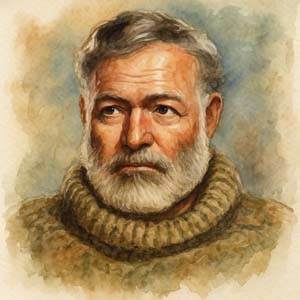— Ernest Hemingway
 A man who wrote in the best and simplest way, literary icon Ernest Miller Hemingway (1899–1961) was born on this day in Oak Park, Illinois.
A man who wrote in the best and simplest way, literary icon Ernest Miller Hemingway (1899–1961) was born on this day in Oak Park, Illinois.
"All limitations are self-imposed," he once said. (Always concise).
A journalist, a soldier, a man of rugged strength who defined machismo before it was "macho," he wrote vivid snapshots of life with powerful words and heart.
"There is no rule on how to write. Sometimes it comes easily and perfectly; sometimes it's like drilling rock and then blasting it out with charges," explained the man who in 1954 survived two plane crashes in Africa. So, he knew first hand about fear and resilience.
"Never confuse movement with action," said Hemingway. His emotional depth is astonishing and he is considered one of the most influential writers of the 20th century.
For his novella The Old Man and the Sea (1952), Hemingway won the 1953 Pulitzer Prize and 1954 Nobel Prize for Literature. Other great works include Death in the Afternoon (1932), The Sun Also Rises (1926), and the World War I classic A Farewell to Arms (1929).
Hemingway was also a master of dialogue. He created strong, unforgettable characters who struggled with demons and searched for grace under pressure. His remarkable stories succinctly celebrated love and pain, death and salvation.
"Writing, at its best, is a lonely life," he observed. "Write hard and clear about what hurts."
✍️Ernest Hemingway is honored on the Top 100 Writers list for crafting stories with courage and clarity.
 Simplicity is best. So is writing "hard and clear."💫
Simplicity is best. So is writing "hard and clear."💫
